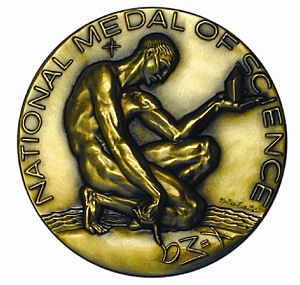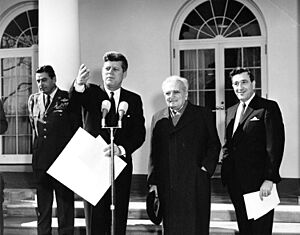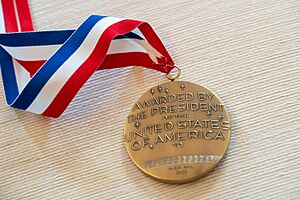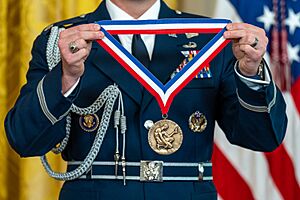National Medal of Science facts for kids
Quick facts for kids National Medal of Science |
|
|---|---|

Obverse of the medal
|
|
| Presented by | President of the United States |
| Location | Washington, D.C. |
| Country | United States |
| First awarded | 1963 |
The National Medal of Science is a very special award given by the President of the United States. It honors people in science and engineering. These people have made big discoveries or helped us understand more about the world. The medal recognizes work in many fields. These include biology, chemistry, physics, mathematics, and engineering. It also includes behavioral and social sciences.
A group of twelve experts, called the Committee on the National Medal of Science, chooses who gets the award. The National Science Foundation (NSF) helps manage this process. This medal is the highest award for science in the United States.
Contents
History of the National Medal of Science
How the Medal Started
The National Medal of Science was created on August 25, 1959. This happened because the Congress of the United States passed a law. At first, the medal was meant for scientists in physical, biological, mathematical, or engineering fields.
Later, on August 23, 1961, President John F. Kennedy set up the Committee on the National Medal of Science. This committee helps decide who should receive the award.
Adding More Science Fields
In 1979, a science group suggested adding more fields to the medal. They wanted to include social and behavioral sciences. Senator Ted Kennedy then helped pass a new law. This law, signed by President Jimmy Carter on December 12, 1980, expanded the medal. Now, it could honor scientists in these new areas too.
First Award and Important Moments
The very first National Medal of Science was given out on February 18, 1963. President John F. Kennedy presented it to Theodore von Kármán. He received it for his important work at the Caltech Jet Propulsion Laboratory. His award recognized his leadership in aeronautics. It also honored his teaching and advice to the Armed Services. He also helped science cooperation around the world.
The first woman to receive this medal was Barbara McClintock in 1970. She was honored for her work on plant genetics.
Award Ceremonies and Recipients
The awards ceremony takes place at the White House. The sitting United States president leads the event.
The law allows for up to 20 medals each year. However, usually 8 to 15 scientists and engineers receive it. There have been some years when no medals were given. For example, no medals were awarded in 1971, 1972, 1977, 1978, 1980, 1984, and 1985.
President Donald J. Trump did not present any National Medals of Science during his time in office. The last time medals were awarded before his presidency was on May 19, 2016. President Barack Obama presented the 2013 and 2014 medals then. More recently, on October 23, 2023, President Joe Biden presented nine Medals of Science. He also presented 12 National Medals of Technology and Innovation. This ceremony took place in the East Room of the White House.
How People Get the Award
Nomination Process
Each year, the National Science Foundation asks for new candidates. People are nominated by other scientists and engineers. Each nomination needs three letters of support. These letters come from experts in science and technology.
The nominations then go to the Committee of the National Medal of Science. This committee has fourteen members chosen by the President. Twelve are scientists. The other two are the director of the Office of Science and Technology Policy (OSTP) and the president of the National Academy of Sciences (NAS).
Who Can Receive the Medal?
To be considered, candidates must be U.S. citizens or permanent residents. If they are permanent residents, they must be applying for U.S. citizenship. They must have done amazing work that has greatly impacted scientific thinking.
The committee also looks for people who help science grow in general. They also value those who have influenced science education. However, groundbreaking research is the most important factor. A nomination lasts for three years. After that, people can be nominated again. The committee then recommends candidates to the President. The President makes the final decision.
Recipients of the Medal
Since Theodore von Kármán received the first medal in 1962, 506 medals have been awarded. Some universities have had many recipients. For example, five universities account for over 31% of all medals.
- Stanford University has had 40 recipients.
- Harvard University is close behind with 35.
- The University of California, Berkeley has 30.
- The Massachusetts Institute of Technology (MIT) has 29.
- The California Institute of Technology (Caltech) has 25.
| Top Institutions | Recipients |
|---|---|
| Stanford | 40 |
| Harvard | 35 |
| Berkeley | 30 |
| MIT | 29 |
| Caltech | 25 |
| Princeton | 18 |
| Chicago | 13 |
| UIUC | 13 |
| Rockefeller | 12 |
| Columbia | 11 |
| Wisconsin | 11 |
See also
 In Spanish: Medalla Nacional de Ciencia (Estados Unidos) para niños
In Spanish: Medalla Nacional de Ciencia (Estados Unidos) para niños
- List of general science and technology awards
- National Medal of Technology and Innovation
- National Medal of Arts
- National Humanities Medal
 | Selma Burke |
 | Pauline Powell Burns |
 | Frederick J. Brown |
 | Robert Blackburn |




